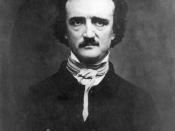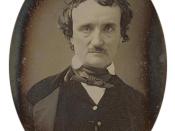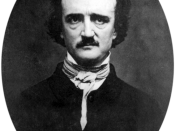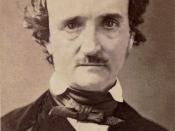The Tell-Tale Climax Through use of foreshadowing and a truly suspenseful tone, Edgar Allan Poe transports his audience from the climax of "The Tell-Tale Heart," quickly to the exposition. Known for his sudden falling actions, Poe uses this technique to leave the reader feeling as though he or she were actually in the narrator's shoes, hearing the heart beat on. This feeling that the reader has is the feeling of being "nervous" (Poe 542); nervous that the heart beat may in fact let the policemen know of this awful crime; nervous that the "evil eye" that "vexed [him]" may still blink on (Poe 543). With the use of a suspenseful tone, Poe not only brings the audience to the narrator's side, but he forces the audience to become the madman.
In "The Tell-Tale Heart," Poe uses every word to his advantage leading up to the climax, fitting in every detail he possibly can fit.
"â¦The sense of hearing acute. I heard all things in the heaven and in the earth. I heard many things in hell" (Poe 542). Poe uses these details to accelerate his falling action by foreshadowing the fact that his "acute" hearing will cause him to indeed go "mad" (Poe 542). He avoids having to inform the reader of these trifle details later in the story when the reader is most interested in the action.
Poe also foreshadows that the narrator's 'horror will be made a mockery of' by offering a laugh at the old man's fear of the noise's (Poe 546). The old man comforted himself saying "It is nothing but the wind in the chimney-it is only a mouse crossing the floor," or "it is merely a cricket which has made a single chirp" (Poe 544). In the abrupt falling action, Poe can find no comfort for the sound he thinks he is hearing. Although the men are not mocking him, Poe believes they are because of his previous mocking of the old man.
In addition to the foreshadowing Poe takes advantage of the use of his tone. "I gasped for breathâ¦talked more quickly-more vehementlyâ¦I arose and argued about trifles, in a high key and with violent gesticulationâ¦I paced the floor to and fro with heavy strides, as if excited to fury by the observation of the menâ¦I foamed-I raved-I swore! I swung the chair upon which I had been sitting, and grated it upon the boardsâ¦I could bear [the men's] hypocritical smiles no longer! I felt that I must scream or die!" (Poe 546). Poe increases the pace by switching from the narrator's nervous thoughts to obvious actions. One second the murderer is thinking of 'what he could do' and the next second he is pounding the floor boards with a chair to silence the noise. The actions show the true intensity that the narrator is feeling.
Another technique Poe uses is his suspenseful repetitive dialogue. Poe throws in key words repetitively throughout the whole falling action forcing the reader to worry about the narrator's guilt. "It grew louder-louder-louderâ¦and now-again!-hark! louder! louder! louder! louder!" (Poe 546). The increased amount of times this word is used helps the reader feel the rate at which the noise is getting louder. By the last thoughts of "louder," the reader is forced to wonder, himself, why the men don't hear this immense loudness.
Through his use of ironic foreshadowing and a truly suspenseful tone-involving repeated phrases-Edgar Allan Poe transfers the audience from the climax of "The Tell-Tale Heart," swiftly to the exposition. Poe tries to emphasis the narrator's fear of the crime by putting the reader in his shoes. Known for his sudden falling actions, Poe uses this feeling that the reader has giver the reader a sense of being "nervous" (Poe 542). Whether the reader be nervous that the heart beat may in fact let the policemen know of this awful crime, or just nervous that the "evil eye" that "vexed [him]" may still blink on (Poe 543), Poe truly brings the reader to be emotionally equivalent with the narrator. With the use of a suspenseful tone, Poe not only brings the audience to the narrator's side, but he forces the audience to become the madman.
Work Cited Poe, Edgar Allan. "The Tell Tale Heart." Literature (3rd Ed.) Kirszner & Mandell. Hercourt Brace College Publishers. 1997





